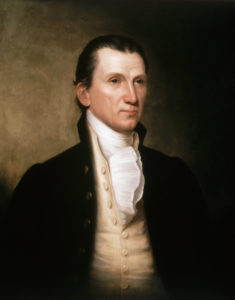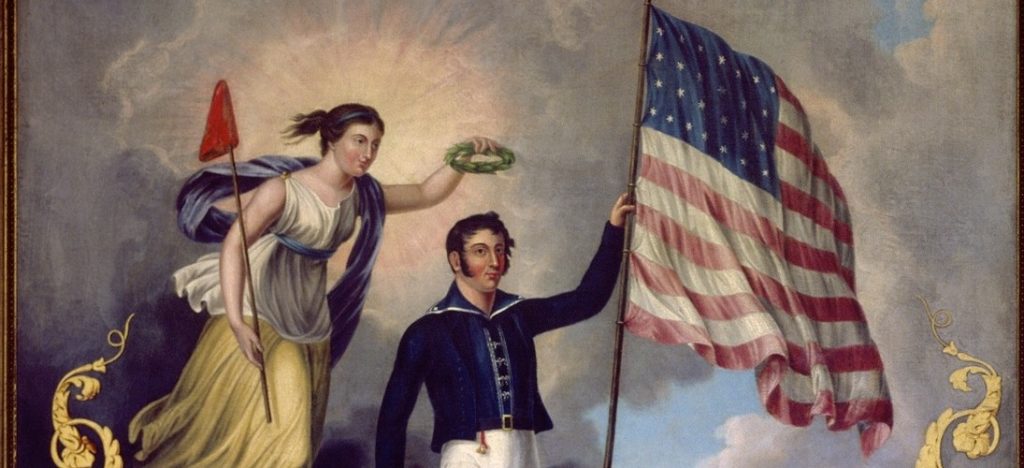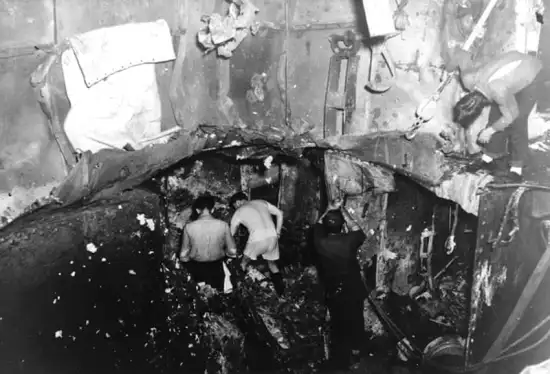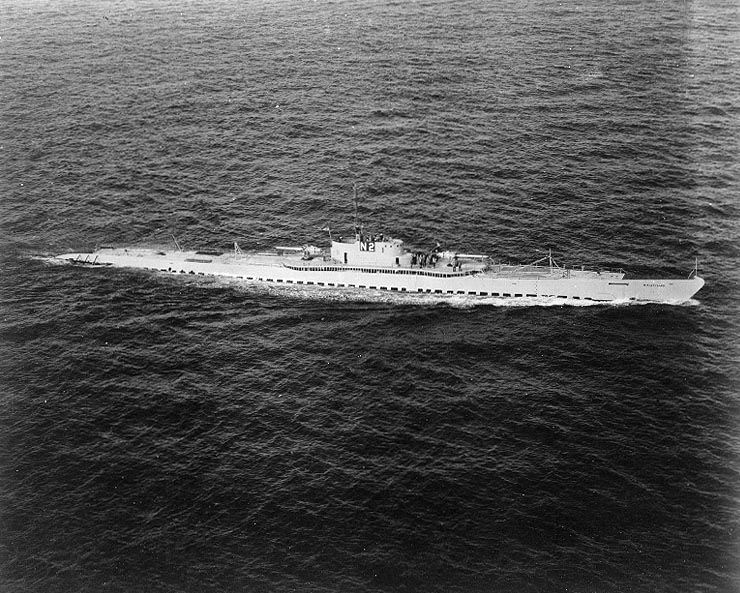I want to take you back
...to periods that reflected much of who we are, who we have become, and who we can be. Back to events that affected all of us today but were almost imperceptible to those living them. Perhaps with one exception.
It was Christmas time. The nation had been at war for almost two years. Things had not gone well. News of early defeats had streamed into the nation's Capital. Richard Rush wrote to his old friend John Adams about the mood in Washington D.C. in December 1813. The nation was fighting, to be sure:
 Richard Rush
Richard Rush
"But it seems to fight for nothing but disaster and defeat . . . and disgrace. What, sir, should be done? The prospect looks black. It is awful. Is not another torrent rolling too fiercely upon us to be turned back? Where shall we find [leaders]? And may we not be doomed to pass yet another and another and another campaign in the school of affliction and disgrace? [I] am sick at heart at the view of our public affairs. Have we, sir, even seen worse times and survived them? And how?"
The aging ex-president John Adams agreed with Rush. "The times are too serious to write." He didn't know what prevented the White House—not called that yet—or the "proud Capitol" from becoming the headquarters of the British. The country, Adams said:
 John Adams
John Adams
"Must have a winnowing, the chaff must be separated from the wheat. The real . . . genius and experience have been neglected [while] froth and ignorance have been promoted." But, said the aged patriot, "don't be discouraged. In our Revolution, we had seen infinitely more difficult and dangerous times."
What stands out about that exchange—and Adams's comment about the British being in the White House and the Capitol—is that it came just eight months before that very thing occurred. In August of 1814, British troops landed, and though badly outnumbered and utterly embarrassed, an army was sent to stop them at Bladensburg, New Jersey. They marched on to Washington, with the President, James Madison, on a horse just miles ahead of them. Indeed, the defeat at Bladensburg was so humiliating—referred to this day as the "Bladensburg Races"—that Madison couldn't find his own Secretary of War, John Armstrong, who was in command of the army in the field.
 As the War of 1812 neared its conclusion, British forces torched the White House, the Capitol, and nearly every other public building in Washington.
As the War of 1812 neared its conclusion, British forces torched the White House, the Capitol, and nearly every other public building in Washington.
In the darkness, Madison, Attorney General Richard Rush, and John Mason, having watched from a distance as American forces threw down their weapons and ran had ridden back to find the White House deserted.
Dolly Madison had left their supper on the table, then left at three in the morning carrying some papers, a few books, and the full portrait of George Washington by Gilbert Stuart. Everything else—silver, valuables, clothes, thousands of dollars worth of fine wines in the cellar—was abandoned.
 image of Dolly Madison saving Washington's portrait Among the most familiar images of Dolley Madison is this fanciful scene of her heroic rescue of George Washington's portrait from the fire set by the British in 1814.
image of Dolly Madison saving Washington's portrait Among the most familiar images of Dolley Madison is this fanciful scene of her heroic rescue of George Washington's portrait from the fire set by the British in 1814.
Madison urged everyone out. The British were literally right behind them. According to one account, he "cooly mounted his horse and rode off to the ferry across the Potomac." He needed to find Dolly, and he needed to find the army or what was left of it. Already the British were burning the Capitol and soon reached the White House and burned that. British General Cockburn planned to capture Madison and "carry him to England for a curiosity."
Madison and his companions didn't find Dolly across the river. She had left much earlier and, due to her husband's unpopularity, had to disguise herself. At one tavern, she was refused admittance. When a friend offered her refuge at his country house, the cook refused to make coffee for her, saying, "I don heerd Mr. Madison and Mr. Armstrong done sold the country to the British."
The President rode on to Great Falls and, not finding his wife there, continued during a vicious windstorm that only fanned the flames back in Washington. But then he learned that the Secretary of War and some of his army were at Rockville, Maryland, 15 miles north of Washington, so he rode there, only to find them gone to Baltimore. Having been in the saddle for 18 hours, Madison rode to Brookville—another 10 hours away, where finally he was able to sleep.
When he finally returned to the White House, it was "in ashes, not an inch, but its cracked and blackened walls remained." Other public buildings were burned. Dead horses lay all over the grounds. The people were terrified. Many wanted to quit.
Mr. Madison wasn't a quitter. He finally caught up to Secretary of War Armstrong—and fired him on the spot, throwing him out of Washington.
 The fall of Washington--or Maddy in full flight - Library of Congress
The fall of Washington--or Maddy in full flight - Library of Congress
Summary Cartoon showing President James Madison and probably John Armstrong, his secretary of war, both with bundles of papers, fleeing from Washington, with burning buildings behind them.
 ca. 1817-1825 --- A portrait of James Monroe (1758-1831), the fifth president of the United States, made during his presidency. He served as President from 1817-1825. --- Image by © Bettmann/CORBIS
ca. 1817-1825 --- A portrait of James Monroe (1758-1831), the fifth president of the United States, made during his presidency. He served as President from 1817-1825. --- Image by © Bettmann/CORBIS
In his stead, he appointed another great future president as the new Secretary of War, James Monroe. When Madison and Armstrong had both disappeared on horseback, Monroe simultaneously held the acting position of both President and Secretary of State. Now James Monroe was Secretary of War as well. He said, "I never went to bed for an entire month."
As if to add one more coal to his head, a group of northeastern elites from the Federalist Party had come very close to forcing a secession by several states—right in the middle of a war against a foreign enemy.
And then, a quiet change. Sunlight, almost instantaneously. A peace treaty was negotiated in Belgium; General Andrew Jackson defeated a major British invasion at New Orleans, and just like that–-right around Christmas—Madison and the United States—had survived. The ensuing decade was called . . . the era of good feelings.
 The era of good feelings
The era of good feelings
Jump ahead with me for 127 years...
My story does not take place at Christmas this time, but in the summer of an equally dark period, 1942, when America had been rocked by defeat after defeat in the Pacific by the Japanese. America's Christmas in 1941 had been one of the bleakest in memory. People were still in shock over the attack at Pearl Harbor, over the fall of plucky Wake Island, and over the steady drumbeat of losses of General MacArthur's men in the Philippines.
The key to everything was the Japanese navy, and the key to the navy was its strike force of four large aircraft carriers. At the time, the United States could only put to sea three, one of which, the Yorktown, was so badly damaged from a previous battle that it was being repaired while at sea in a frenzy of engineering and construction genius of 1400 men working around the clock.
 Yorktown-damage-belowdecks
Yorktown-damage-belowdecks
Through superior codebreaking, the Americans, for once, knew where the Japanese would be—right off Midway Island—and when they would be there. But the Pacific Ocean is a big place. Being "in the vicinity" still can put you off by over a thousand miles. America's carriers knew roughly where the Japanese fleet was—but not exactly. When the enemy finally showed up, the Americans sent over 100 aircraft from Midway Island. All these attackers failed to land a single bomb on a single enemy ship. But the force kept moving, and now the American carriers, themselves moving to intercept them, had to locate this fleet.
Armed with evidence of roughly where the Japanese were and generally in which direction they were moving, the American carriers launched nearly every ship-killing torpedo plane they could in the general direction of the enemy. The planes arrived haphazardly, completely out of normal practices for attacking ships. One by one, then several at a time, the American torpedo planes were shot down—more than 50 of them fell into the sea! Only three made it back to their carriers. Not one had scored a single hit.
 The Battle of Midway in June of 1942 was one of the most important naval battles in world history and a turning point in the Second World War.
The Battle of Midway in June of 1942 was one of the most important naval battles in world history and a turning point in the Second World War.
This was indeed desperation. America was down to about thirty dive bombers against a fleet of 100 ships and at least 100 fighter planes. And the dive bombers had not been given clear coordinates as to where the carriers were. They were searching, like almost everyone else. They were low on fuel. No sign.
Then the smallest of changes...
At the outset of the battle, a single American submarine, the Nautilis, had found the Japanese fleet. It patiently worked its way inside the protective screen to fire three torpedoes at one carrier. Only one hit. It was a dud. Nautilis had utterly failed. Or had it?
 USS_Nautilus_(SS-168)
USS_Nautilus_(SS-168)
A Japanese destroyer was on the Nautilis in minutes, forcing her under. The Nautilis ran. The destroyer followed. Hours later, the Japanese destroyer, convinced it had chased off the sub, turned and headed back for its main fleet and the carriers.
In the skies above, the desperate dive bombers, nearly at their maximum range of fuel, having failed to find the carriers all day, saw a single Japanese ship. A destroyer. This was unusual. It would normally be with a fleet. Was that where it was heading? Out of options, they followed. Soon, the horizon was dotted with Japanese warships and the four big carriers. And all the Japanese fighter planes? They were either out of gas or off chasing the hapless torpedo planes, men who had sacrificed themselves for this miraculous opportunity.
It was literally over in five minutes. Coming out of nowhere, American dive bombers so thoroughly damaged three of the carriers that the Japanese themselves had to finish them off, and the next day, a return visit sank the fourth. The War in the Pacific had been won—oh, it would demand an enormous amount of blood and treasure over more than three years to force Japan to surrender, but after Midway, they simply couldn't win.
All because of a failed mission and a little change of a lone destroyer following the Nautilis.
I think about that submarine a lot. It failed spectacularly. Just like those courageous torpedo bombers who gave their lives, apparently for no reason. And yet. It was the Nautilis that enabled the dive bombers to find the carriers. It was the torpedo planes that pulled away the protection. It was nerdy, unseen codebreakers that had learned where the Japanese would be.
We may have had a difficult election, but no one knows what the ramifications of it will be. None of us know if we are the Nautilis, performing a task that appears to have failed, only to lay a brick in a massive foundation of victory. None of us know if we are with Mr. Madison, barely ahead of the barbarian hordes in August or walking back into glory at Christmas. But we know this. As John Adams says, we have seen worse times, and such times produce a winnowing.
And we know this. There are always quitters. Those never enter the history books as legends. Rather it is those who took us from the steam engine to the search engine, from the first step on the North Pole to the first footprint on the Moon, from mastering the Mississippi to navigating hyperspace and quantum physics. A handful of thuggish, mouth-breathing, World Economic Forum malcontent minions, backed by all the crypto from Sam Bankman-Fried's funny-money computers and all the digitally-concocted money in Communist China, do not get the privilege of leading this nation. True genius is beyond them, true patriotism is anathema to them, and true goodness is repellant to them.
This season
...celebrate what at the time was a seemingly small change that affected a tiny few. Another baby was born in the Middle East. Outside His family—and those who knew the prophecies—no one knew His Name. Yet the little change of His birth overturned the entire world, changed how we mark our calendars and gave hope to billions. One little change named Jesus the Messiah.

This Christmas, America merely awaits the new spirit of change, the spirit that demands not a return to yesterday but a march toward tomorrow. America yearns for both that spirit of good and the spirit of great. That spirit that says mediocrity is no longer acceptable, that decline is unavoidable, or that social decay is inevitable. Instead, this new spirit of Christmas starts today. It starts here. It starts now. It starts in every heart and hearth, every home and RV, every mansion and apartment. Be a Nautilis. Do your job with courage and conviction, with certainty that even if you fail in what you think was your mission, you have played your part that the Creator of the universe will play His. Your ripples are noticed. Your faith is rewarded. And your patriotism is appreciated. Celebrate the change of the world. Merry Christmas, and God Bless America.


